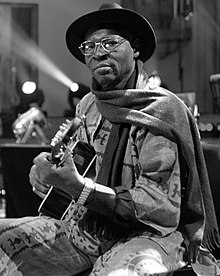Ali Farka Toure
| Ali Farka Touré | |
|---|---|
 |
|
| Background information | |
| Birth name | Ali Ibrahim Touré |
| Born |
October 31, 1939 Timbuktu, Mali |
| Origin | Niafunké, Mali |
| Died | March 7, 2006 (aged 66) Bamako, Mali |
| Genres |
Blues Malian Folk Folk |
| Instruments | Vocals, Guitar, Cabasa, Njarka |
| Labels | World Circuit |
Ali Ibrahim "Ali Farka" Touré (October 31, 1939 – March 7, 2006) was a Malian singer and multi-instrumentalist, and one of the African continent's most internationally renowned musicians. His music is widely regarded as representing a point of intersection of traditional Malian music and its North American cousin, the blues. The belief that the latter is historically derived from the former is reflected in Martin Scorsese's often quoted characterization of Touré's tradition as constituting "the DNA of the blues". Touré was ranked number 76 on Rolling Stone's list of "The 100 Greatest Guitarists of All Time" and number 37 on Spin magazine's "100 Greatest Guitarists of All Time".
Touré was born in 1939 in the village of Kanau, on the banks of the Niger River in Gourma-Rharous Cercle in the northwestern Malian region of Tombouctou. His family moved to the nearby village of Niafunké when he was still an infant. He was the tenth son of his mother but the only one to survive past infancy. "The name I was given was Ali Ibrahim, but it's a custom in Africa to give a child a strange nickname if you have had other children who have died", Touré was quoted as saying in a biography on his Record Label, World Circuit Records. His nickname, "Farka", chosen by his parents, means "donkey", an animal admired for its tenacity and stubbornness: "Let me make one thing clear. I'm the donkey that nobody climbs on!" Ethnically, he was part Songrai, part Fula.
As the first African bluesman to achieve widespread popularity on his home continent, Touré was often known as "the African John Lee Hooker". Musically, the many superpositions of guitars and rhythms in his music were similar to John Lee Hooker's hypnotic blues style. He usually sang in one of several African languages, mostly Songhay, Fulfulde, Tamasheq or Bambara as on his breakthrough album, Ali Farka Touré, which established his reputation in the world music community.
...
Wikipedia
